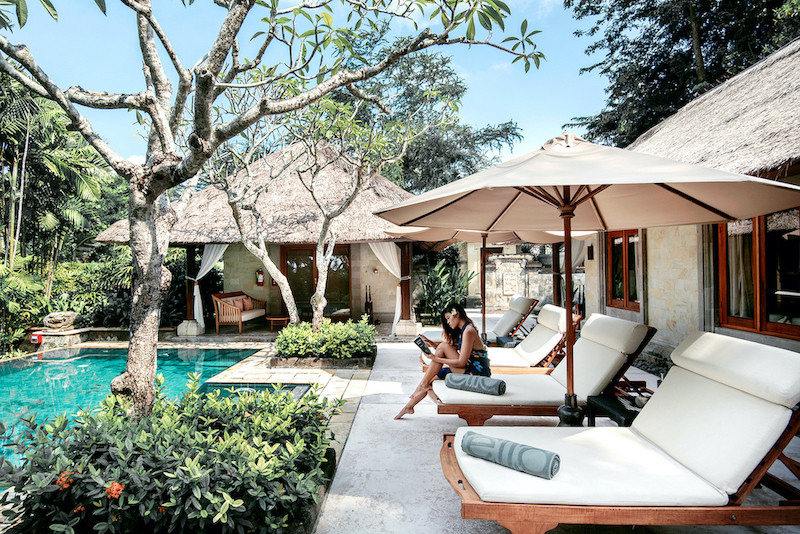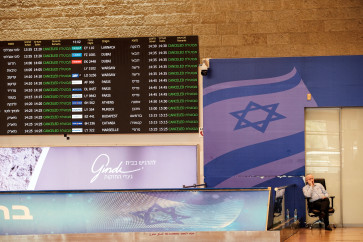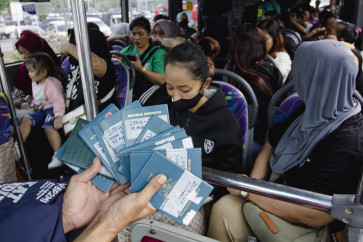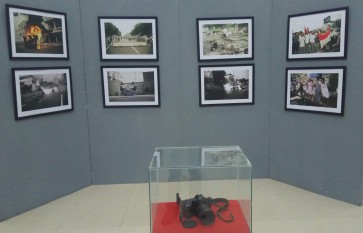Popular Reads
Top Results
Can't find what you're looking for?
View all search resultsPopular Reads
Top Results
Can't find what you're looking for?
View all search resultsDigital nomad lifestyle draws urbanites back to nature
Urbanites who realize that they can work from anywhere, thanks to the omnipresent internet connection and the advancement of mobile technology, have embraced the new lifestyle as digital nomads.
Change text size
Gift Premium Articles
to Anyone

I
t has been well documented that the limitations on mobility resulting from the COVID-19 pandemic can lead to cabin fever for most people forced to work from home.
Some workers have resorted to armchair travel and digital immersion, while others still go out to socialize in-person – flaunting protocols just to get some measure of respite.
However, a growing number of urbanites, who realize that they can work from anywhere thanks to omnipresent internet connection and advances in mobile technology, have embraced life as digital nomads.
The lifestyle choice, no longer reserved for cosmopolitan foreigners working on their laptops from the porches of a beachside resort somewhere in the Global South, is now being adopted by an increasing number of Indonesians who choose to move away from the city and work from a more quiet and relaxing sanctum.
A software engineer for a prominent Jakarta-based tech company, Andrew Daniel has been living in Bali since September last year.
Ditching his shoe-box bedroom in South Jakarta, the 25-year-old has rented a villa in Kerobokan with some friends and is embracing his new routine of surfing at the nearby beach after a few hours of work.
“It started off with just needing to get away from the city. Jakarta was getting depressing because of the COVID-19 situation and I wanted a change of atmosphere,” he told The Jakarta Post earlier this week.
“I chose Bali because I knew I wanted a beach, it's already well-known for being a great digital nomad city, I had friends here and all the villas are [being rented out] at a discount.”
The Jakarta native said that working and living in Bali has allowed him to save money, living a more slow-paced lifestyle while still working productively.
“The good thing about Bali is that it's one hour ahead of Jakarta, where the rest of my team is at, so I can start a little later and yet still be pretty early. I'd work from 10 a.m. to 6 p.m., taking about an hour to cook lunch. If it's not raining, I go to the beach to catch the sunset,” Andrew said, explaining his routine.
Read also: Bali deportation of 'digital nomad' unearths post-colonial power dynamics
On weekends, he can spend the day surfing or venturing to other parts of Bali such as Ubud and Uluwatu. After a few weeks living in a villa, he and his friends move to another rental so that they can always have a change of scenery – all the while saving enough for a rainy day.
Andrew said he spent around 40 percent of his income to pay for the lifestyle, while the rest went into savings.
Eunike Kartini, 34, agrees that living as a digital nomad in Bali is cheaper compared to when she had to work from an office in Jakarta.
As a social media manager for a private firm who earns at least Rp 30 million (US$2,138) a month, she spends just Rp 1.7 million to rent a room in Sidakarya village in Denpasar and around Rp 30,000 a day for simple meals.
The hobbyist photographer said she could now allocate a portion of her income for investments and would still be able to enjoy spending money on recreation.
She said she loved staycations at villas and hanging out in cafes in eastern, northern and western Bali, which are off the beaten path, and reviews them on her Instagram account @tarinaminusta.
The Bekasi, West Java native went to Bali in March last year for a short trip but got stuck on the Island after local officials closed the provincial borders following the announcement of the first COVID-19 cases.
The company she works for also strictly prohibits employees from returning to the office and has introduced a long-term work-from-home policy.
Eunike decided to rent a bedroom in Bali instead of coming home to Jakarta where the COVID-19 transmission rate is still very high. She also chose Denpasar to avoid the touristy environment and instead embrace the pleasures of locality.
“Here I can start my day by walking 5,000 to 10,000 steps in the morning to the nearby beach and then come back to start working. Here I feel less stressed and more productive. I can only spend two working hours for something I normally do for eight hours,” she said.
She also loves the change of perspective she experiences while living in Bali.
“In Bali I can position myself where I am not a Jakartan, from Java, who always comes first in the media. I love seeing how locals operate in preventing the spread of COVID-19. When I’m here, I feel like I am more abiding by the regulations compared to when I was in Jakarta,” Eunike said.
“I have ‘lived’ in my 11 months and I don’t think I am done [with my time in Bali]. Even when the pandemic is over, I might try to find a way to stay here.”
Read also: What law? Digital nomad brouhaha raises legal vacuum concerns
The growing number of digital nomads and the undeniable convenience of staying extensively at resorts might help keep the tourism-based economy in Bali and other tourism centers afloat.
Tourism and Creative Economy Minister Sandiaga Uno had suggested setting up a tourism program for digital nomads, which he dubbed “Work from Destination”.
“People can work from destinations; [people from] Jakarta and Bandung can work in Yogyakarta or Bali,” Sandiaga said during the 2021 Economic Outlook KAHMIPreneur webinar on Jan. 3.
Tourism has suffered a terrible blow from the pandemic. From January to September last year, foreign tourist visits to Indonesia dropped 74.7 percent from the same period in 2019.
The government is in the midst of preparing 10 new destinations to complement Bali, which remains Indonesia’s number one tourist destination.
Dubbed the New Balis, in accordance with a 2016 presidential regulation, the new destinations comprise Tanjung Kelayang in Bangka Belitung, Borobudur temple in Central Java, Morotai in North Maluku, Komodo Island and Labuan Bajo in East Nusa Tenggara, Wakatobi National Park in Southeast Sulawesi, the Thousand Islands in Jakarta, Toba Lake in North Sumatra, Bromo Tengger Semeru National Park in East Java, Mandalika and Lombok in West Nusa Tenggara, and Tanjung Lesung in Banten.
Not all of these destinations, however, can support the digital nomad lifestyle, as many of them attract tourists for their natural beauty, while digital nomads need strong internet connection, reliable electricity and adequate infrastructure.









